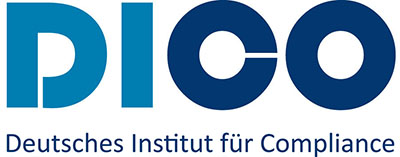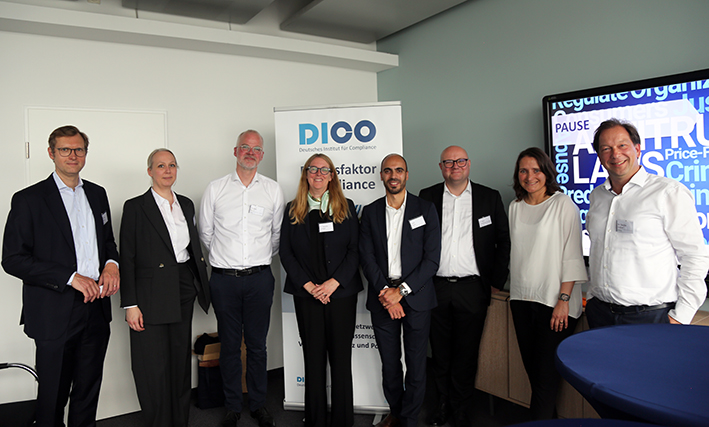A DICO Talk of the Antitrust Law Working Group took place yesterday in Düsseldorf in front of a large number of guests. In the offices of the law firm Fieldfisher, five renowned representatives from companies, antitrust authorities and the legal profession spoke and discussed the topic of “Current developments in antitrust compliance and their impact on the area of antitrust damages”.
After an introductory welcome by Kim-Simone Janutta from the Otto Group, Prof. Dr. Daniela Seeliger and Kaan Gürer, both from Linklaters, presented their legal perspectives. According to Seeliger and Gürer, current antitrust law issues have become increasingly complex. Classic hardcore cartels are less common today and the focus is increasingly shifting to questions of permissible cooperation, for example in the areas of sustainability and technology/innovation. The need for training in antitrust law is now necessary in a variety of areas, whereas in the past it was mainly located in purchasing and sales.
Dr. Katrin Roesen, Bundeskartellamt, then gave some personal impressions on the topic. It is important to remain vigilant as a competition authority in the future and to invest in effective antitrust compliance as a company. Although there is a greater overall awareness of antitrust compliance, the risk of illegal agreements still exists. Despite a certain decline in leniency applications since 2017, several of the Bundeskartellamt’s current cases concerning serious illegal agreements are based on leniency applications or cooperation contributions from companies. In addition, the Bundeskartellamt also has other important sources of information, in particular (anonymous) tips from insiders, tips from other investigating authorities and publicly available information. Several ongoing fine proceedings were based on sources outside the leniency program. In conclusion, Roesen emphasized that compliance should not be a fig leaf and must be lived by company management in order to be effective, even in difficult economic times.
Dr. Thilo Reimers, Deutsche Bahn, spoke about current developments in antitrust compliance from a corporate perspective. He emphasized that, in his view, the decline in classic price-fixing cartels was primarily due to the compliance efforts of companies. From an in-house perspective, the boundary between compliance and legal advice is becoming increasingly blurred, e.g. when advising on new business models, cooperations or sales strategies. Reimers confirmed that compliance training is now carried out in a wide variety of corporate divisions. It can be assumed that they could be enriched in the future with tools that use artificial intelligence (e.g. in the further development of e-learning).
Finally, Dr. Alex Petrasincu, Hausfeld, spoke from the perspective of a law firm specializing in the prosecution of antitrust damages claims. Due to an established regulatory framework, according to Petrasincu, it is now the norm for companies to deal intensively with the possibilities of pursuing antitrust damages claims. With the decline of classic (price) cartels, litigation law firms have expanded their area of activity to include the defense against abuse of market power. Claims for damages under antitrust law are indeed likely to have made leniency applications less attractive. However, leniency applicants could be privileged in damages proceedings in the future, e.g. by receiving compensation from the other cartelists in internal settlements.
This was followed by a panel discussion of the speakers, moderated by Dr. Reto Batzel, MARCK, which was supplemented by comments and questions from the guests.
DICO would like to thank Fieldfisher for their hospitality and the numerous guests for their interest and contributions!

